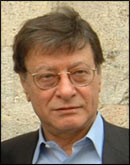 The poet Mahmoud Darwish was the voice of the Palestinian odyssey, whose stark writing reflected the desperation and alienation of the Palestinian people. He published more than 20 collections of poetry, which have been translated into many languages (although few of them into English), and was the Arab world's best-selling poet. His poems are engraved in the hearts of millions of Palestinians and his words have been shouted by anti-occupation demonstrators in the streets of Ramallah, Damascus and Cairo. Many have been set to music, including "I yearn for my mother's bread."
The poet Mahmoud Darwish was the voice of the Palestinian odyssey, whose stark writing reflected the desperation and alienation of the Palestinian people. He published more than 20 collections of poetry, which have been translated into many languages (although few of them into English), and was the Arab world's best-selling poet. His poems are engraved in the hearts of millions of Palestinians and his words have been shouted by anti-occupation demonstrators in the streets of Ramallah, Damascus and Cairo. Many have been set to music, including "I yearn for my mother's bread."
Mahmoud Darwish was born in 1941 in al Birweh, an Arab village in the Acre region which became part of the new state of Israel in 1948. His family fled to Lebanon, although they returned the following year. Darwish published his first poetry collection, Asafir bila ajniha ("Wingless Birds", 1960) while still a teenager and soon made a reputation as a "poet of the resistance". One of his best known poems was "Identity Card", with its defiant opening lines "Record! I am an Arab/And my identity card is number fifty thousand".
Darwish was arrested three times by Israel for reciting "inciting poems" and left for Cairo in the Seventies. He joined the ranks of the Palestine Liberation Organisation (the PLO) and became close to its leader Yasser Arafat. In 1987 he was elected to the PLO's executive committee and it was Darwish who wrote the declaration of independence of 1988 read out by Arafat when he proclaimed the state of Palestine.
He returned to live in Ramallah after the signing of the Oslo Accords in 1993 between Israel and the PLO, but he had expressed his opposition to Oslo and left the PLO's executive committee in protest. Many Palestinians criticised him for having left his homeland, and he defended himself by saying that he had served the Palestinian cause abroad better than when he was inside.
"There was a halo around him in my mind until I met in him in 1996," said the literary editor Iyad Rajoub. "He was no longer the poet of resistance, he was soft, he was living a luxurious life. I was shocked. I could not imagine that he was the one who had written 'Record! I am an Arab'."
Mahmoud Atshan, Professor of Modern Literature in Birzeit University, saw this change in Darwish as a positive transformation. "Darwish was moving away from the narrow Palestinian circle to universality," he said. "He had crossed the borders of Palestine and entered the world."
Darwish had twice undergone surgery for heart problems and in his later poems expressed his sadness at the approach of death, but also at the divisions among his fellow Palestinians. In a recent article, he had criticised secular Arabs and Palestinians for backing Hamas.
Last July, he gave a poetry reading in Ramallah: "He was giving roses to people who came to listen to his poetry," said Mahmoud Atshan. "When he shook hands with me, and gave me a rose, I felt he was saying farewell." His last collection was published earlier this year.
Mahmoud Darwish, poet and writer: born al Birweh, Palestine 13 March 1941; married first Rana Kabbani (marriage dissolved), second Hayat Heeni (marriage dissolved); died Houston, Texas 9 August 2008.
The Independent, Monday, 11 August 2008